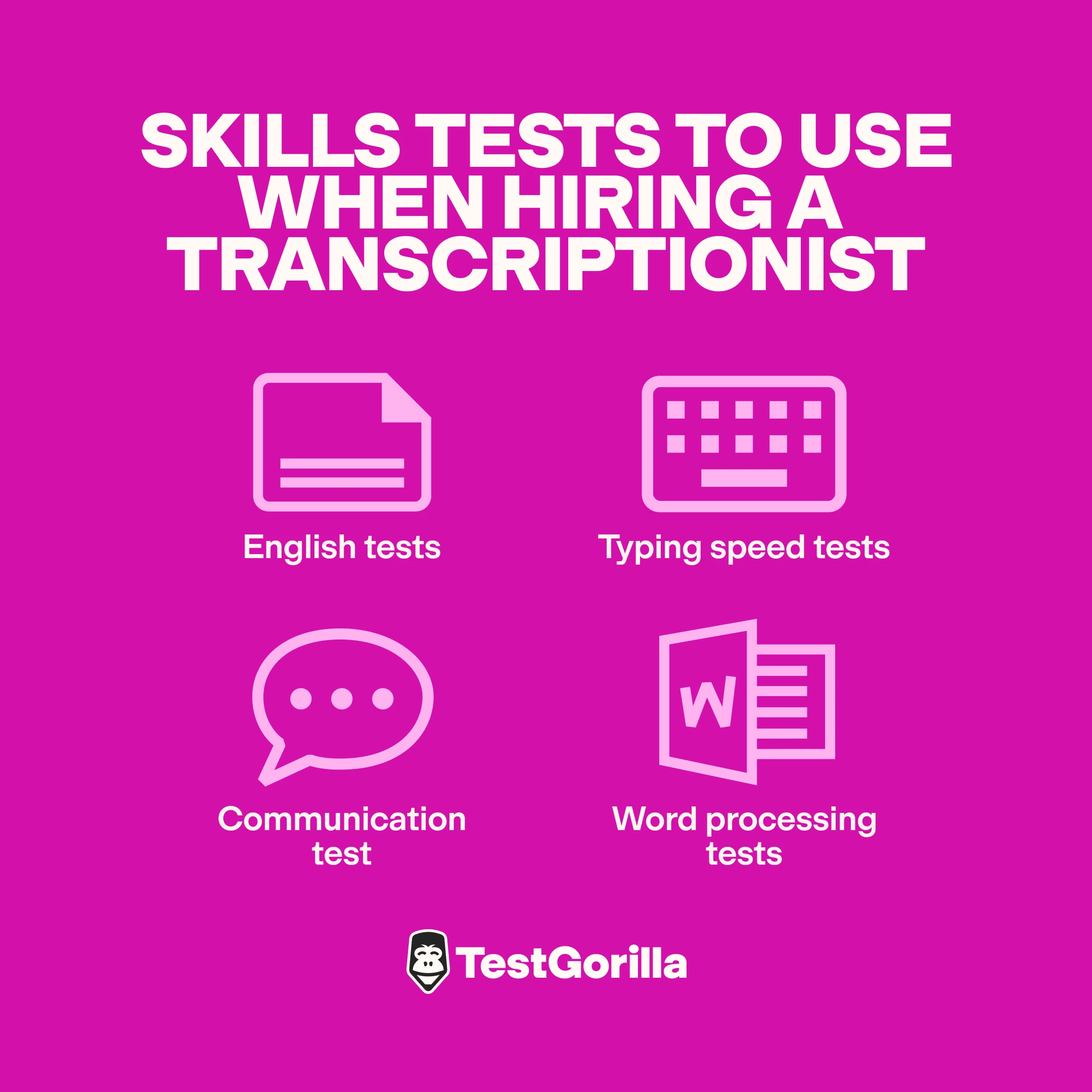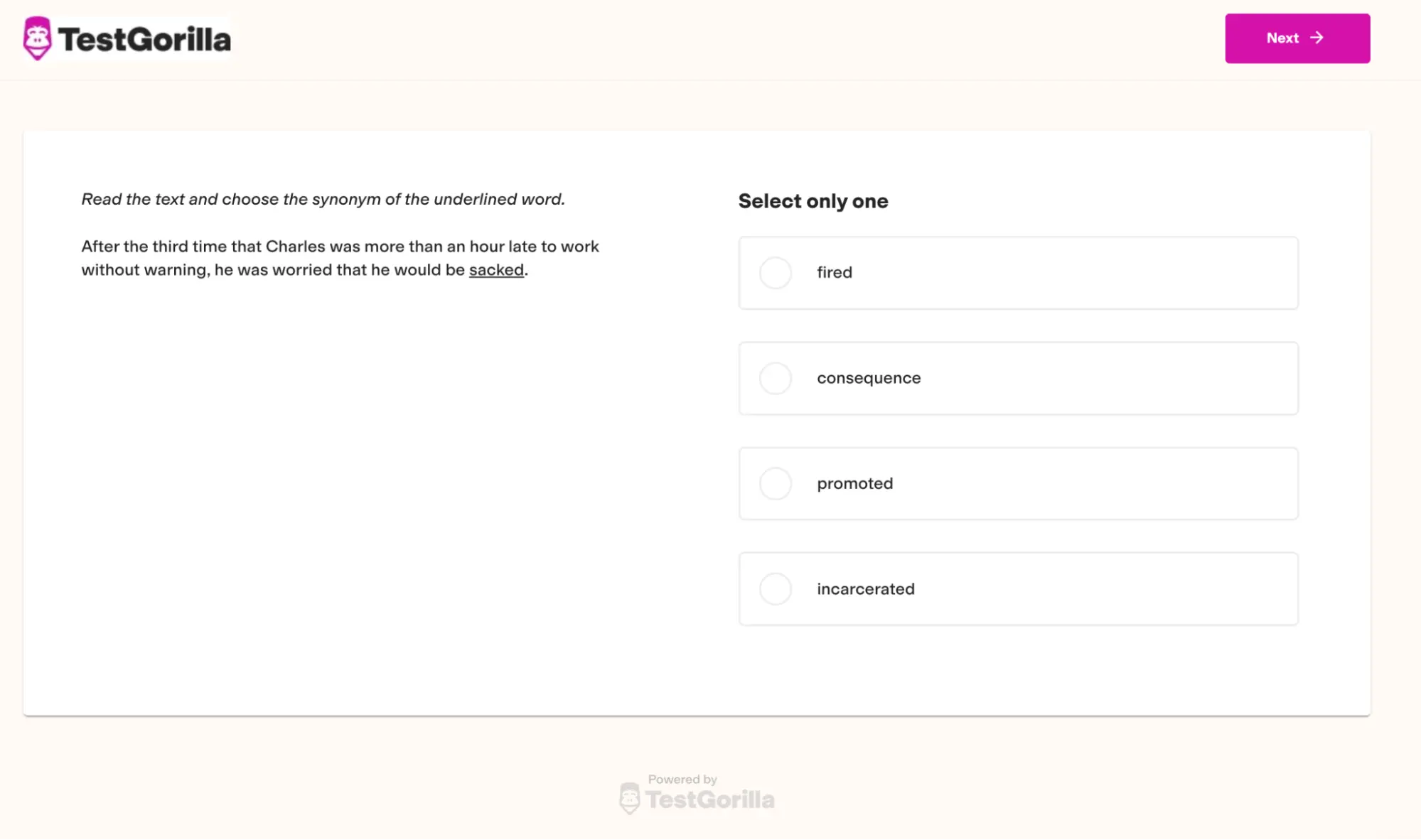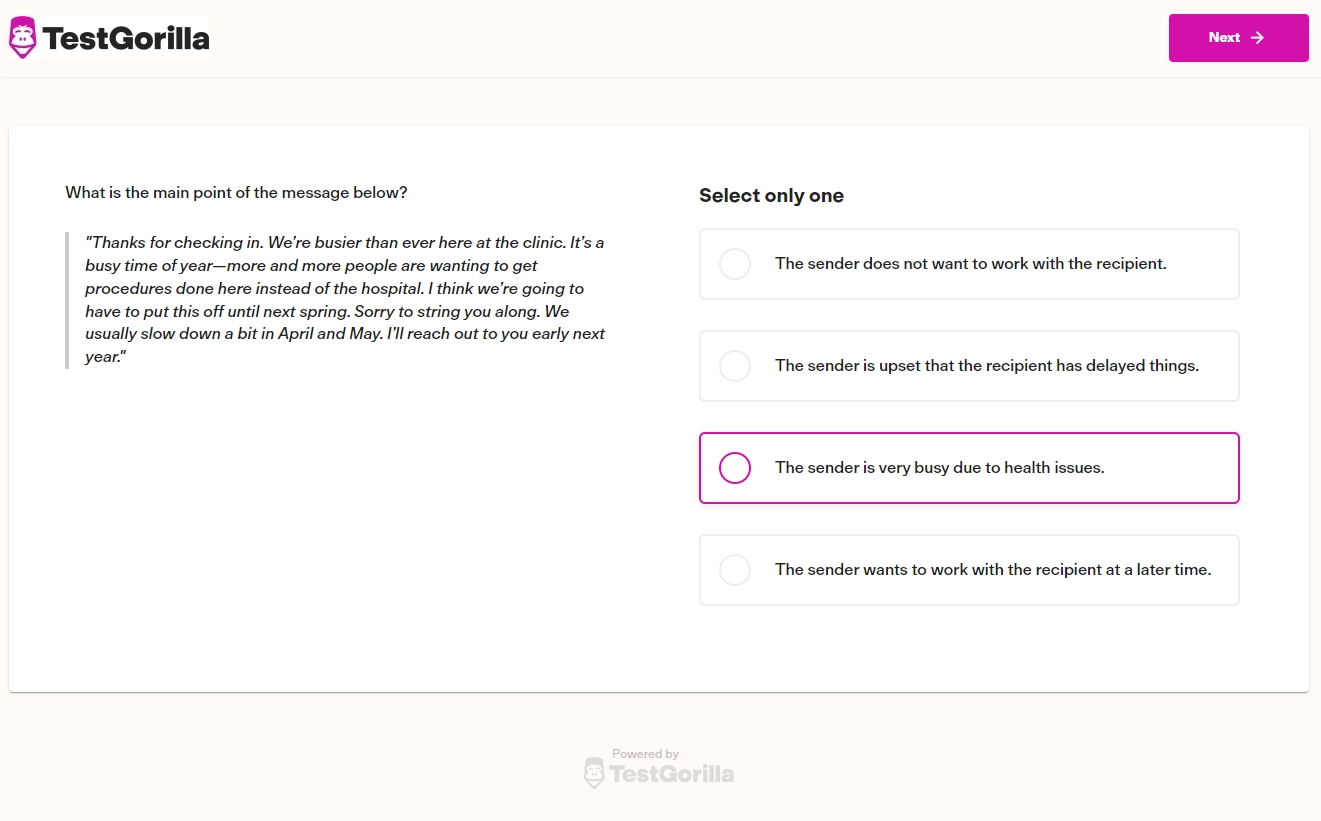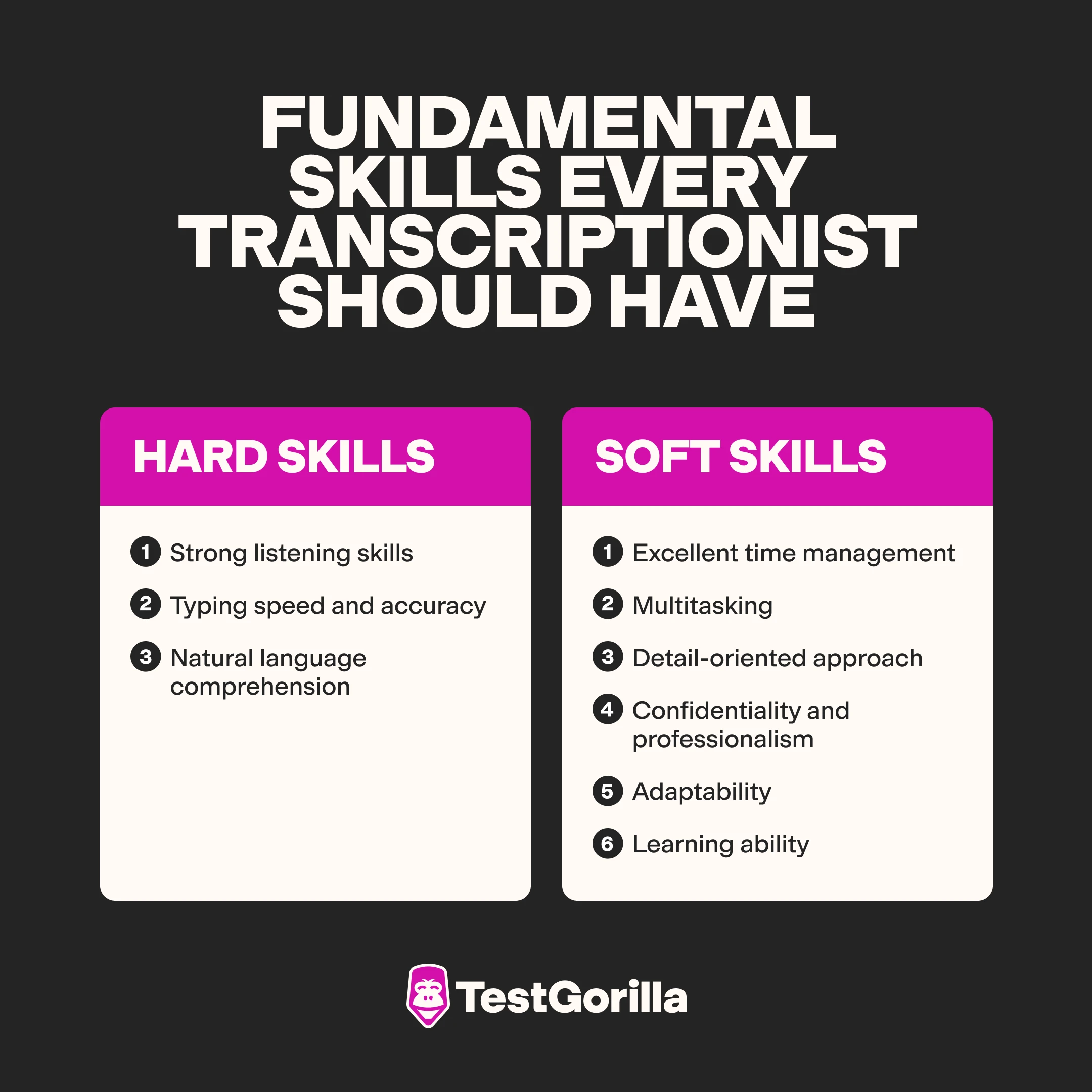Hire for skills with talent assessment software
Whether it’s meeting minutes or legal notes, you can’t afford transcription errors. Details falling through the cracks are simply not worth it, which is why hiring skilled transcriptionists is so critical for your business.
To help you find the best transcriptionists, we’ve put together a list of the 9 key transcription skills to hire for.
Finding candidates with the top transcription skills is a breeze with our pre-employment testing software. As a bonus, check out our guide for how to develop your team’s transcription skills as an employee or HR professional.
Table of contents
- 9 fundamental transcription skills and competencies
- How to assess core transcription skills and traits with talent assessments
- Summary: The 9 top transcription skills and how to test for them
- How to develop transcription skills
- How TestGorilla empowers you to find the best transcriptionists
- Transcription skills FAQs
9 fundamental transcription skills and competencies
To build a team of skilled transcriptionists, always screen for the most valuable skill sets.
Here are the 9 top general transcription skills you can’t miss out on:
Transcriptionist hard skills
1. Strong listening skills
Excellent transcriptionists demonstrate exceptional listening skills, whether listening to a live dictation, audio file, or video recording.
They are active listeners who can focus and concentrate for extended periods, ensuring they capture every word. Their keen attention to detail lets them understand different accents, dialects, and speech patterns for more precise transcription.
2. Typing speed and accuracy
Transcriptionists need great typing skills, with a balance of speed and accuracy. Those who can maintain a high typing speed while ensuring quality transcripts increase productivity and turnaround time, contributing to efficient transcription processes.
Many transcriptionists, such as those working on medical transcriptions, must learn specialized abbreviations to spend less time typing long terms and increase words per minute (WPM).
3. Natural language comprehension
Language comprehension is a vital skill for transcriptionists, so it’s important to assess the English communication skills of all new applicants. They should possess a firm grasp of grammar, vocabulary, and language conventions.
Transcriptionists with excellent language skills give your international organization the edge over teams that rely on voice recognition transcription software that struggles to understand diverse speakers.
Build a talented team with TestGorilla
From language comprehension to time management skills, TestGorilla helps you hire the best. Our friendly experts are happy to show you how it’s done.
Transcriptionist soft skills
4. Excellent time management
Time management is an important skill needed for transcriptionists, who often work under strict deadlines. The ability to prioritize tasks, manage time effectively, and meet deadlines is essential.
Transcriptionists with excellent time management skills can organize their workload efficiently, ensuring timely delivery of transcriptions without compromising quality.
5. Multitasking
Being a proficient transcriptionist is a tall order. Between exercising listening, typing, and editing skills at once, the best transcriptionists are excellent multitaskers. Transcriptionists may even need to use multiple body parts simultaneously, such as operating a foot pedal to control audio levels while typing a transcription.
Be sure to build your team of transcriptionists with demonstrated multitasking skills or backgrounds in fast-moving jobs or industries.
6. Detail-oriented approach
Successful transcriptionists exhibit a detail-oriented approach in their work. They pay meticulous attention to punctuation, formatting, grammar, and spelling. Their commitment to perfection ensures that they consistently create accurate transcriptions.
A detail-oriented transcriptionist produces high-quality work that reflects precision and professionalism, which gives your team a key edge over organizations that depend on automatic transcription.
7. Confidentiality and professionalism
Transcription jobs frequently work with sensitive or confidential information, such as legal transcriptions or transcriptions of healthcare reports.
These transcriptionists need to maintain strict discretion and professionalism in handling such data. Those who demonstrate integrity and respect for privacy ensure that confidential information remains secure and trust is maintained.
8. Adaptability
Transcriptionists typically work on high-velocity, high-importance projects. Having an adaptable personality ensures that your transcriptionist candidate is ready to roll with the punches and adapt to change on the fly.
Of course, adaptability is far from a skill necessary only to transcriptionists. McKinsey identifies adaptability as the one skill that everyone needs in the workplace.
9. Learning ability
Transcriptionists operating in diverse industries encounter various subject matters and specialized terminology. Self-motivated transcriptionists possess research skills and a willingness to continuously learn and expand their knowledge.
They can quickly grasp new concepts, conduct research when needed, and adapt their transcription style to various contexts, ensuring accurate and comprehensive transcriptions. For example, medical transcriptionists must learn a wide array of medical terminology.
The ability to learn is also one of the key skills needed for transcriptionist job security. Paradoxically, automated transcription tools can be less accurate as they learn more, so organizations are more likely to trust skilled human transcriptionists for their mission-critical documents.
Now that you have the top 9 transcriptionist skills, you need the transcription skills assessments to identify those skills and grow your team.
How to assess core transcription skills and traits with talent assessments
Finding the right applicant goes beyond transcribing tests for typing speed or accuracy alone. It requires a holistic approach that accounts for the specific skills and traits essential for a successful transcriptionist.
At TestGorilla, we understand that every organization is unique, so we offer tests for skills and traits ready to be tailored to your specific requirements. With our extensive test library, you can build a complete assessment for transcriptionists that aligns with your company’s needs.
Whether you’re looking for candidates with exceptional language proficiency, excellent listening skills, or the ability to transcribe complex technical jargon, you can find the right tests to evaluate these specific traits.
Below are some of our recommended skills and traits tests for transcriptionists:
English tests
As a transcriptionist, having a solid grasp of the English language is essential for accurately transcribing audio recordings or written material.
English tests help employers assess a candidate’s grammar skills, ensuring they can produce properly structured and grammatically correct transcripts.
Candidates who excel in these tests demonstrate their ability to transcribe audio or written content without error, capturing the intended meaning and maintaining the integrity of the original material. Plus, candidates with strong English skills are more likely to produce polished and error-free transcripts, enhancing the quality and reliability of the transcribed documents.
TestGorilla offers at least five English tests aimed at different levels, from the English A2 test (Elementary) to the English C2 test (Proficient). We suggest using the C1 and C2 level tests for transcriptionists.
For more preview questions, check here to see the English C1 sample test.
Typing speed tests
TestGorilla’s Typing Speed tests are invaluable in evaluating the suitability of candidates for transcriptionist roles. Our assessments are perfect for measuring an individual’s ability to type accurately and efficiently.
Different typing speed tests can provide unique insights into a candidate’s skills and aptitude for specific aspects of transcription work.
Let’s explore how each of these various typing tests can be useful in their own way:
The Typing Speed (Lowercase Only) test assesses a candidate’s speed and accuracy when typing lowercase letters. Candidates who perform well in this test demonstrate their ability to type quickly and precisely, ensuring efficient transcription.
The Typing Speed (Capitalization and Punctuation) test gauges a candidate’s proficiency in typing perfectly while incorporating capitalization and punctuation marks. Transcriptionists often encounter audio or written content that requires appropriate capitalization and punctuation to convey the intended meaning.
The 10-Key Typing test (Decimals and Operators) test measures a candidate’s speed and accuracy using the numeric keypad for typing numbers, decimals, and mathematical operators. It’s beneficial for transcriptionists who need to transcribe data that involves numerical information, such as financial records or statistical data.
The 10-Key Typing test (Numbers Only) test focuses specifically on a candidate’s typing speed and accuracy when entering numerical information using the numeric keypad. Candidates who excel in this test show their proficiency in meticulously transcribing numerical content, such as dates, quantities, or phone numbers.
Communication test
When providing a transcription service, clear and effective communication is crucial for understanding the transcribed content and ensuring the final transcript’s accuracy.
TestGorilla’s Communication test is a great transcription test example that assesses a candidate’s proficiency in understanding and following instructions, which is vital for faithfully transcribing audio recordings or written material according to specific guidelines.
Furthermore, communication tests assess a candidate’s ability to convey information accurately and clearly through written communication. Transcriptionists often need to produce written transcripts that are coherent, well-structured, and grammatically correct.
This especially applies to edited transcriptions, which focus more on concisely capturing the intended meaning of the content being transcribed rather than the exact word choice.
Word processing tests
A Microsoft Word test measures one of the computer skills a transcriptionist must have. The test assesses word processing skills to evaluate the transcriptionist’s proficiency in this widely used software.
By administering the Microsoft Word test, employers gain valuable insights into a candidate’s ability to navigate the software, apply formatting and templates, and use various features to produce accurate and well-organized transcriptions.
Similarly, a Google Docs test also gauges the word-processing skills of transcriptionists. Google Docs is a cloud-based free alternative platform that offers collaboration with clients, proofreaders, editors, or anyone else a transcriptionist could work with.
By screening for tech skills, you are building a team with the digital dexterity that Harvard Business Review identifies as a key contributor to fast-growing teams.
The best insights on HR and recruitment, delivered to your inbox.
Biweekly updates. No spam. Unsubscribe any time.
Summary: The 9 top transcription skills and how to test for them
To recap, the best transcriptionists demonstrate these in-demand hard skills and soft skills:
Listening skills
Typing speed and accuracy
Language comprehension
Time management
Multitasking
Attention to detail
Confidentiality and professionalism
Adaptability
Learning ability
To hire the most efficient transcriptionists, you can evaluate your candidates with these transcription skill assessments:
Transcriptionist Skills | Transcriptionist Skill Assessments |
Language comprehension | - English C1 test (Advanced) - English C2 test (Proficient) |
Typing speed and accuracy | - Typing Speed (Lowercase Only) test - Typing Speed (Capitalization and Punctuation) test - 10-Key Typing test (Decimals and Operators) - 10-Key Typing test (Numbers Only) |
Listening skills | Communication test |
Ability to learn | Technical system tests like our Microsoft Word test or Google Docs test |
All the tests mentioned in this table can be found in our test library.
How to develop transcription skills
Whether you plan to upskill your team of transcriptionists or improve transcription skills on your own, developing your transcription skills is straightforward with the right strategy.
To improve transcription skills, you should practice:
Active listening: Active listening is both a skill and a mindset. Try focusing on the speaker and pick up their nuance and train of thought. This helps you transcribe conversations quickly and accurately. Practice it in your day-to-day conversations before using it in the workplace.
Typing: When performing tasks on the computer, practice typing for speed and accuracy. Try to build up until you are writing crisp sentences at a good typing speed. A great way to practice is to write your own subtitles while watching shows and movies at your leisure.
Technical skills: As a transcriptionist, your job is digital. Mastering the tech systems that you work with helps you excel professionally. Whether your organization uses Microsoft Word or Google Docs, you should read guides or take online courses on the program so that you can navigate and operate it efficiently.
How TestGorilla empowers you to find the best transcriptionists
When it comes to assessing transcription skills for business, TestGorilla is your ultimate partner in finding top-notch candidates. Our transcription tests assess candidates’ ability to:
Work with different accents
Decipher complex audio recordings
Maintain a high level of attention to detail and concentration throughout the process
By using TestGorilla’s comprehensive assessments, you can ensure that your newly employed transcriptionists have the skills to consistently deliver exceptional results.
Join thousands of companies worldwide who have leveraged TestGorilla’s platform to streamline their hiring process and discover top transcription talent.
When you are ready to start with skills-based hiring, we’re here to help you.
Book a free 30-minute live demo to see first-hand how easy it can be to hire the best candidates with a skills-based approach.
Alternatively, to test our system at your own pace, sign up for a Free forever plan today!
Transcription skills FAQs
Here are answers to four commonly asked questions about transcription skills for business:
What are transcription skills in writing?
Transcription skills in writing are basic skills, like spelling and grammar, that are essential to recording a spoken conversation. Often seen as a building block of more complex compositions, transcription skills are fundamental in the workplace for accurate recordkeeping.
What is a transcription skills assessment?
A transcription skills assessment is a measurable test of an applicant’s ability to convert a conversation or audio recording into a written document. During a transcribing test, candidates are typically presented with audio recordings or spoken passages that they must transcribe into written text.
Talent assessments let you analyze the candidate’s listening skills, transcription accuracy, language comprehension, and typing speed. This provides you with valuable insights into their abilities and suitability for the role.
To learn how leading organizations hire measurably better candidates, sign up for a free live demo of our pre-employment assessment software.
Why are transcription skills important?
Highly skilled transcriptionists help your organization in countless ways, including:
Accurate recordkeeping: For high-stakes interactions that require transcription, having a meticulous record of the proceedings is critical
Enhanced productivity: By assigning transcription to skilled transcriptionists, you free up your executives who would otherwise be taking notes to contribute their specialized skills at the highest level
Organizational clarity: Precise transcription creates documents that stakeholders can take in at a glance without needing to worry about missing nuance or factual inaccuracies
What are the 3 types of transcription?
There are three types of transcription:
Verbatim transcription: Often used in legal settings, verbatim transcription is a direct conversion of spoken words into a written document. Verbatim transcription gives the most accurate record of what was said but is often cumbersome to read.
Intelligent verbatim transcription: Used in a wide variety of contexts such as journalism and print media, intelligent verbatim description is a conversion of spoken words that removes non-essential words for clarity. Stutters, vocalizations, and filler words like “um” or “so” are removed.
Edited transcription: Often used in business contexts like marketing, edited transcription gives the reader a heavily edited transcript of the conversation. The transcriptionist may rephrase sentences, remove redundant sentences, and make changes to improve the overall readability of the transcription.
You've scrolled this far
Why not try TestGorilla for free, and see what happens when you put skills first.




















